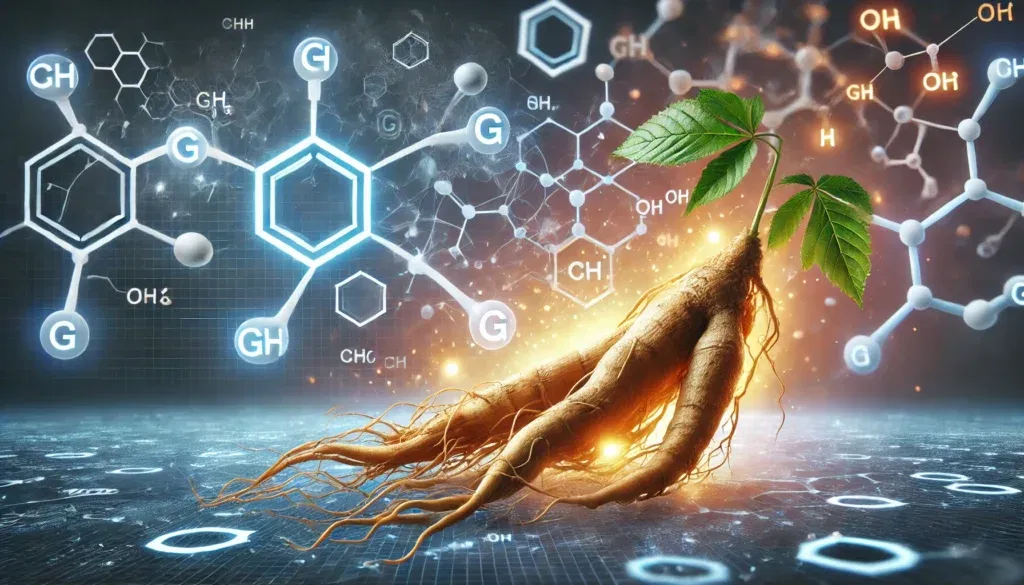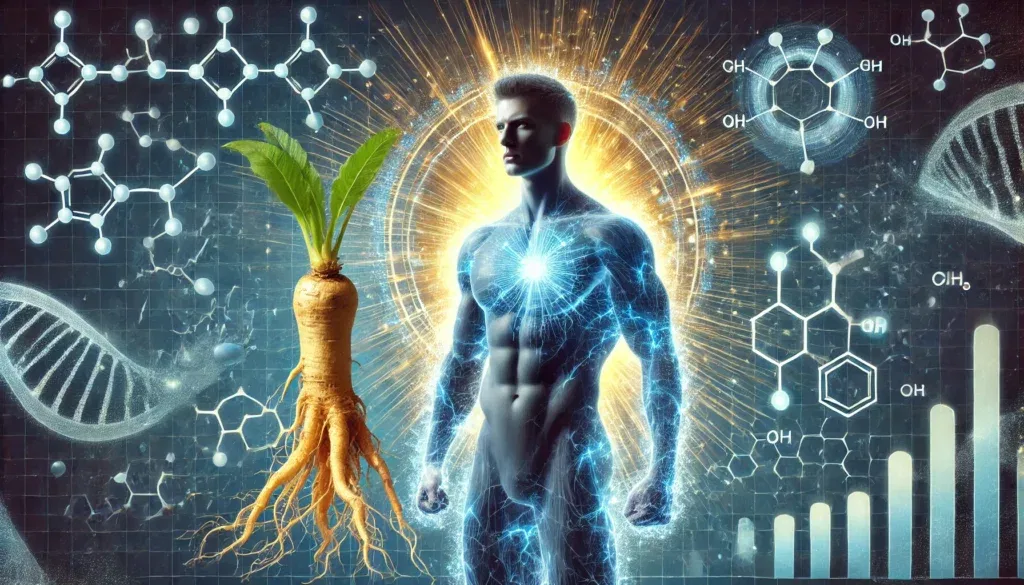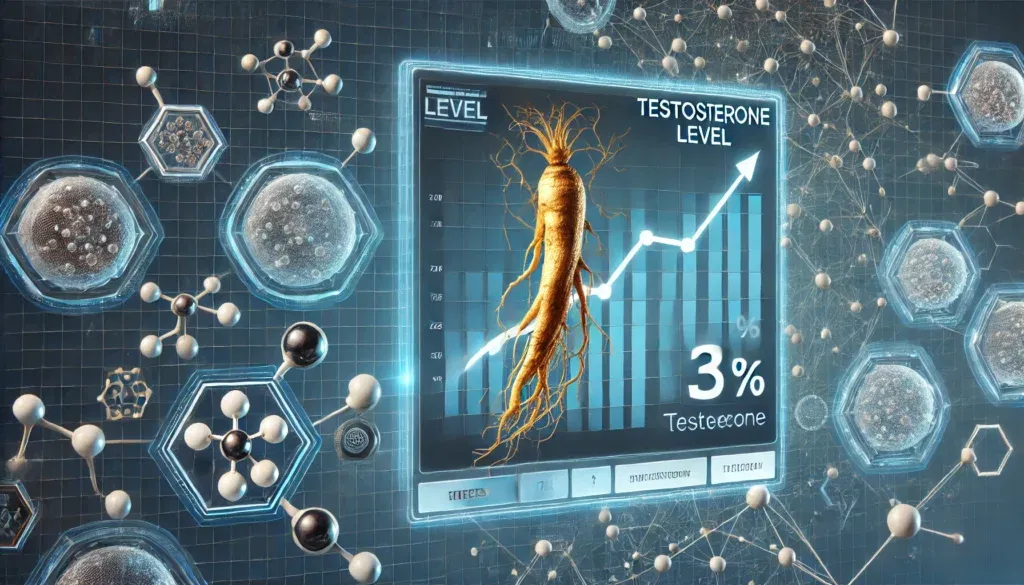Ginseng has long been revered in traditional medicine for its wide array of health benefits, ranging from boosting energy levels to improving cognitive function. One of the more intriguing claims surrounding ginseng is its potential role in enhancing testosterone levels. With an increasing interest in natural approaches to hormone optimization, many men are turning to ginseng as a potential solution for declining testosterone. But does ginseng increase testosterone? The scientific community has explored this question extensively, and while some studies suggest promising results, others indicate that the link may not be as direct as commonly believed. To fully understand ginseng’s potential impact on testosterone, it is necessary to delve into its active compounds, its effects on the endocrine system, and the available clinical evidence supporting or refuting these claims.
You may also like: How to Increase Testosterone Levels Naturally: Science-Backed Strategies for Men’s Health & Longevity
Understanding Ginseng: Types, Active Compounds, and Historical Use
Ginseng is a root that has been used for centuries in traditional medicine, particularly in East Asian and Native American healing practices. There are several varieties of ginseng, but the two most widely studied are Panax ginseng (Asian ginseng) and Panax quinquefolius (American ginseng). Each type contains bioactive compounds known as ginsenosides, which are believed to be responsible for many of ginseng’s therapeutic effects. These compounds exhibit antioxidant, anti-inflammatory, and adaptogenic properties, all of which contribute to the root’s ability to influence various bodily systems.
Historically, ginseng has been used to promote vitality, increase stamina, and enhance cognitive function. It has also been employed as an aphrodisiac, with traditional healers claiming that it can enhance male virility and sexual performance. These historical applications have led researchers to investigate whether ginseng can genuinely support male hormone production and, more specifically, increase testosterone levels.

The Endocrine System and Testosterone Regulation
Testosterone is the primary male sex hormone responsible for regulating various physiological functions, including muscle growth, bone density, libido, and mood. It is produced primarily in the testes, with a smaller amount synthesized in the adrenal glands. The production of testosterone is controlled by the hypothalamic-pituitary-gonadal (HPG) axis, a complex network of hormonal signals that regulate reproductive function.
The hypothalamus releases gonadotropin-releasing hormone (GnRH), which stimulates the pituitary gland to secrete luteinizing hormone (LH). LH then signals the Leydig cells in the testes to produce testosterone. Any substance that influences this pathway can potentially alter testosterone levels. Given that ginseng has been reported to affect endocrine function, researchers have examined whether it can modulate testosterone production through the HPG axis.
Ginseng’s Influence on Testosterone: Reviewing the Scientific Evidence
Numerous studies have explored the relationship between ginseng and testosterone, with mixed results. Some animal studies have shown that ginseng supplementation can enhance testosterone levels by stimulating the HPG axis. For instance, research on rodents has indicated that ginsenosides may promote the release of LH and subsequently increase testosterone production in the testes. Additionally, ginseng has been found to enhance nitric oxide synthesis, which plays a crucial role in vasodilation and may contribute to improved blood flow to the testes, indirectly supporting testosterone synthesis.
Human studies, however, have produced more variable outcomes. Some clinical trials suggest that ginseng supplementation may improve testosterone levels in men with low baseline levels, while others indicate no significant hormonal changes. For example, a study published in the Journal of Urology found that men with erectile dysfunction who took ginseng experienced improvements in sexual function, but there were no substantial increases in testosterone levels. Conversely, a separate study in Phytotherapy Research reported a slight but significant increase in serum testosterone among participants who consumed ginseng extract for several weeks.
One possible explanation for these discrepancies is the form and dosage of ginseng used in studies. Whole ginseng root, ginseng extracts, and ginsenoside-enriched formulations may produce different effects due to variations in bioavailability and potency. Furthermore, individual factors such as age, baseline testosterone levels, and overall health status can influence how a person responds to ginseng supplementation.
Potential Mechanisms Through Which Ginseng May Support Hormonal Balance
Even if ginseng does not directly boost testosterone levels, it may still contribute to hormonal balance through several mechanisms. First, ginseng’s adaptogenic properties help the body respond to stress, which is crucial since chronic stress and elevated cortisol levels can suppress testosterone production. By reducing cortisol levels and enhancing resilience to stress, ginseng may create a more favorable hormonal environment for testosterone synthesis.
Second, ginseng has been shown to improve insulin sensitivity and support metabolic health. Insulin resistance and metabolic syndrome are closely linked to lower testosterone levels, so improving metabolic function can indirectly support hormonal balance. Studies have suggested that ginseng supplementation can enhance glucose metabolism and reduce inflammation, both of which may positively impact testosterone levels.
Lastly, ginseng’s effects on sexual health should not be overlooked. Research indicates that ginseng can improve erectile function, increase libido, and enhance sperm quality. While these effects may not be directly mediated by increased testosterone, they suggest that ginseng plays a role in optimizing male reproductive health.
Practical Considerations: How to Use Ginseng for Hormonal Support
For individuals considering ginseng as a natural approach to supporting testosterone levels, several factors should be taken into account. The type of ginseng, dosage, and duration of use all influence its effectiveness. Most studies suggest that doses ranging from 200 mg to 1,000 mg of standardized ginseng extract per day may be beneficial. It is also important to choose high-quality products from reputable sources, as ginseng supplements vary widely in their potency and purity.
Ginseng can be consumed in various forms, including capsules, teas, and tinctures. While some people may experience immediate effects, others may require several weeks of consistent use to notice benefits. As with any supplement, it is advisable to consult with a healthcare provider before incorporating ginseng into a routine, especially for individuals with underlying health conditions or those taking medications that may interact with ginseng.

Frequently Asked Questions (FAQ) About Ginseng and Testosterone
1. Does ginseng boost testosterone naturally?
Yes, ginseng is often promoted as a natural testosterone booster due to its bioactive compounds known as ginsenosides. These compounds have been studied for their potential to enhance hormone production, improve circulation, and support overall male reproductive health. However, while some research suggests that ginseng can help optimize testosterone levels, results vary based on individual factors such as age, health status, and dosage. It’s important to note that while ginseng and testosterone levels may be linked, ginseng should not be seen as a replacement for medical treatments for low testosterone. Consulting a healthcare professional before using ginseng supplements for hormone balance is advisable.
2. Can ginseng increase testosterone levels in older men?
Age-related testosterone decline is a common concern among men, leading many to seek natural solutions like ginseng. Some studies indicate that ginseng can increase testosterone production by stimulating the hypothalamic-pituitary-gonadal (HPG) axis, which regulates hormone levels. Additionally, ginseng’s adaptogenic properties help reduce stress and fatigue, which can indirectly support healthy testosterone levels. However, the effectiveness of ginseng and testosterone enhancement in older men depends on factors such as lifestyle, diet, and overall health. While ginseng may offer some benefits, combining it with proper nutrition, exercise, and medical guidance is essential for optimal hormonal balance.
3. How does ginseng affect testosterone compared to other herbal supplements?
Ginseng is one of many natural herbs believed to influence testosterone levels, but its mechanism of action differs from other supplements like ashwagandha or fenugreek. Unlike some herbs that primarily increase free testosterone by inhibiting SHBG (sex hormone-binding globulin), ginseng works by enhancing overall vitality, improving circulation, and supporting adrenal function. This holistic approach makes ginseng a valuable option for those looking to enhance energy levels, libido, and hormone balance simultaneously. However, when comparing ginseng and testosterone benefits to other herbal remedies, it’s essential to consider individual responses and scientific evidence supporting each supplement’s effectiveness.
4. Are there specific types of ginseng that are better for testosterone support?
There are multiple types of ginseng, but Panax ginseng (also known as Korean red ginseng) is the most widely studied for its impact on testosterone levels. This variety contains higher concentrations of ginsenosides, which may contribute to improved hormone regulation and increased nitric oxide production. American ginseng, on the other hand, is more commonly associated with immune support and stress reduction rather than direct testosterone enhancement. When considering ginseng and testosterone-boosting benefits, choosing high-quality Panax ginseng supplements with standardized ginsenoside content is recommended for the best results.
5. How long does it take for ginseng to increase testosterone levels?
The time frame for experiencing the effects of ginseng on testosterone levels varies based on factors such as dosage, lifestyle habits, and individual metabolism. Some studies suggest that noticeable changes in energy levels and libido can occur within a few weeks of consistent use. However, significant hormonal shifts may take several months of regular supplementation. It’s crucial to take ginseng as part of a comprehensive approach to health, including proper diet, exercise, and stress management, to maximize its potential testosterone-boosting effects.
6. Does ginseng boost testosterone in athletes and bodybuilders?
Athletes and bodybuilders often seek natural ways to enhance performance, and some evidence suggests that ginseng may support testosterone production and muscle recovery. By improving circulation and reducing oxidative stress, ginseng may contribute to better endurance and reduced post-exercise fatigue. Additionally, ginseng and testosterone levels may be linked in terms of improved strength and stamina, making it a useful supplement for those engaged in intense training. However, it should be used in conjunction with a balanced diet and resistance training for optimal benefits.
7. Are there any risks associated with using ginseng to increase testosterone?
While ginseng is generally safe for most individuals, excessive use may lead to side effects such as insomnia, headaches, or digestive discomfort. Additionally, those with hormone-sensitive conditions, high blood pressure, or diabetes should exercise caution when using ginseng and testosterone-enhancing supplements. It’s also important to source ginseng from reputable manufacturers to ensure purity and avoid contaminants. Consulting a healthcare provider before starting any new supplement regimen is the best approach to minimize potential risks.
8. Can ginseng increase testosterone in men with low libido?
Yes, ginseng has been traditionally used as a natural aphrodisiac due to its ability to improve circulation, reduce stress, and enhance energy levels. Several studies suggest that ginseng may help boost libido by positively influencing testosterone levels and nitric oxide production, leading to better blood flow. Men experiencing low libido due to stress or fatigue may benefit from ginseng supplementation as part of a holistic approach to hormonal balance. However, addressing underlying causes of low libido, such as poor sleep or chronic stress, is also necessary for long-term improvements.
9. How should ginseng be taken for maximum testosterone benefits?
To maximize the benefits of ginseng and testosterone enhancement, it’s essential to follow a proper dosage regimen. Most studies recommend taking 200–600 mg of standardized Panax ginseng extract per day, preferably in the morning to avoid sleep disturbances. Combining ginseng with a well-balanced diet rich in zinc, vitamin D, and healthy fats can further support testosterone production. Additionally, cycling ginseng—taking it for several weeks followed by a short break—may help maintain its effectiveness over time. Always consult a healthcare professional before making significant changes to your supplement routine.
10. Can women take ginseng for hormone balance?
While ginseng is commonly associated with testosterone support in men, it can also be beneficial for women’s hormone balance. Ginseng’s adaptogenic properties help regulate cortisol levels, reduce fatigue, and support overall endocrine function. In some cases, women experiencing hormonal imbalances, low energy, or stress-related symptoms may find ginseng helpful. However, since ginseng and testosterone modulation primarily target male hormonal pathways, women should consult their healthcare provider before using ginseng supplements regularly. Finding the right dosage and formulation for individual needs is key to experiencing its full benefits.

Conclusion: Does Ginseng Increase Testosterone?
The question of whether ginseng increases testosterone does not have a simple yes or no answer. While some studies suggest that ginseng may modestly enhance testosterone levels, the overall body of evidence remains inconclusive. However, ginseng’s potential benefits extend beyond testosterone production. By reducing stress, improving metabolic health, and enhancing sexual function, ginseng can contribute to overall hormonal balance and male vitality. For those looking for a natural way to support their endocrine health, ginseng represents a promising option—though it should not be relied upon as a sole solution for low testosterone. Future research may provide more definitive answers, but for now, ginseng remains a valuable herbal remedy with a diverse range of health benefits.
natural testosterone boosters, herbal testosterone support, adaptogens and hormones, boosting male vitality, testosterone supplements, natural libido enhancers, ginsenosides and testosterone, herbal remedies for men’s health, endocrine system support, metabolic health and testosterone, nitric oxide and sexual function, ginseng root benefits, hormonal balance in men, stress reduction and testosterone, natural aphrodisiacs, herbal medicine for energy, traditional Chinese medicine and testosterone, testosterone and sexual health, plant-based hormone boosters, best ginseng supplements
Further Reading:
Ginseng and male reproductive function
7 Possible Health Benefits of Ginseng
Disclaimer: The information provided in this article is for general informational purposes only. The content does not constitute professional advice of any kind, including but not limited to medical, legal, or financial advice. HisHealthMag and its contributors make no representations or warranties regarding the accuracy, completeness, or reliability of the information presented. Always seek the advice of a qualified professional for any specific concerns or questions you may have. Neither HisHealthMag nor its authors assume any responsibility or liability for any actions taken based on the information provided in this article. The views and opinions expressed are those of the author(s) and do not necessarily reflect the official policy or position of HisHealthMag.





